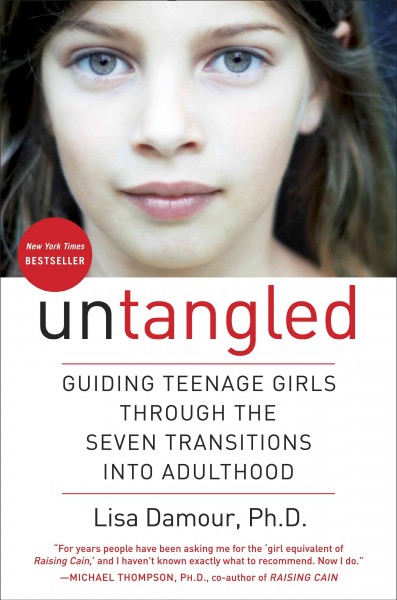
Although I’ve been a teenage girl myself, I’m no expert when it comes to parenting one. Looking for guidance, I found Untangled: Guiding Teenage Girls Through the Seven Transitions into Adulthood by Lisa Damour, Ph.D. Immediately, I saw myself and my daughters reflected in the book’s true-to-life anecdotes sprinkled with psychotherapy know-how.
Take this passage in the first chapter, “Parting with Childhood”: “One minute your daughter lobbies to download songs with raunchy lyrics, and the next, she curls up on the couch in the exact same position she adopted at age 6 to read a book she enjoyed at age 8.” That may seem confusing, but, Damour explains, the “seemingly paradoxical behavior is actually brilliant.”
Your daughter, writes Damour, is parting with childhood in fits and starts, rather than all in one terrifying go. This process can be difficult for parents as they “mourn” the loss of their little girl, but it’s important to connect with the woman she’s becoming.
Ding! With that, the lightbulb turned on. Instead of fearing the natural process of my daughters growing up, I need to embrace the young women they’re becoming.
There are seven stages to this process, writes Damour in her new book, and no right way to navigate it. For my money, though, Damour is a pretty good guide. She directs Laurel School’s Center for Research on Girls, writes a column for The New York Times, teaches at Case Western Reserve University and maintains a private psychotherapy practice.
Here’s what she had to say about the stages of transition.
Q: We typically think of girls at ages 11 and 12 as tweens. Why include them in a book with the word “teenage” in the subtitle?
A: There’s this expectation that 11 and 12 isn’t like it really is . . . ages 11–14 can be really intense. Many 11-year-olds want to go to their room and close the door. We think we should be getting along with our kids and if we aren’t, there’s something wrong.
If I had to have another title for my book it would have been: It’s Not About You. If your 11-year-old was forthcoming and your 12-year-old doesn’t want to talk, parents take it personally. It’s not personal: That’s normal development.
Q: Before I had a tween, I believed my kids wouldn’t want me around anymore. Now I know my tween and teen both pull away and hold tight, often on the same day. How do you explain this push-and-pull phenomenon?
A: Teens totally want us to go way, except when they need us. The emotional whiplash of parenting a teenager is getting pulled in and pushed away again and again.
Teenagers are like swimmers: The water is their world, and we are the edges of the pool holding them together. Eventually a girl has a bad lap and she comes scrabbling to the edge of the pool, trying to get her breath back.
For the parents, the experience is usually, “I’m so happy she’s back!” For the girl, she feels like a baby at the pool’s edge the moment she gets her breath back, so she pushes her parents away. She can be snarky and very abrupt, and it’s hard for the parents if they don’t expect the push.

Q: How can parents be better at managing our teens’ outbursts but also asking them to be kinder?
A: There’s not a one-size-fits-all response that is going to work for all families all the time. The balance of parenting is getting it right over the course of years.
For a rude teenager, we need [a variety of] different responses. There’s [the scenario of] the kid said something and the parent leaving the room and not engaging. There’s ‘You’re being rude and knock it off.’ Or ‘That’s not really like you. Are you OK?’ Any of these are perfectly reasonable responses. Parents feel like there’s one right response, but that doesn’t reflect human life.
When we look at really successful kids, we see that they come from families that contain warmth and structure. The goal is to have a decent amount of time and warmth, but you aren’t going to have both every day. Home is a place where we can relax, and we don’t need to fix things and make things right every minute.
Q: In Untangled, you discuss venting and complaining. What’s the difference and how can parents recognize it?
A: When teenagers complain, they can give the impression that somebody needs to do something. But most of what teens talk about can’t be fixed: bothersome friends, bad classes, etc. It’s helpful if we ask them, ‘Do you want my help with this or do you just need to vent?’ Venting is valuable, and adults do it all the time. We just need to unload, but we don’t need anyone to fix anything.
Recently, I asked high school juniors what they wanted me to talk about with their parents. One of the girls said, ‘I want you to tell my parents that when I tell them about my school day, I just want them to say, “OMG, that sucks!”’Of course, it’s really well-meaning [as a parent] to ask your daughter if she’s tried this or has she thought of that, but what she really wants to do is just dump it and move on.
Q: These two sentences are underlined in my copy of the book: ‘Must we fight? Can’t we build emotional intelligence without fighting?’ Explain this idea. How can fighting help teach our kids emotional intelligence?
A: What it comes down is to how the fighting happens. There are fights when everyone attacks each other, or when people withdraw or when people give in. What we want to get to is when we say to the teenager, ‘Hey, here is where I’m coming from and where are you coming from and can we make this work?’ We are trying to help teenagers have more insight into what is going on inside of them. This helps drive their mental health.
Arguments are not always going to go well. There’s something really powerful about saying, ‘I just messed up. I had a really bad reaction. Can we have a do-over?’ This is saying, ‘I’m human, I’m going to make mistakes and I’m going to try to fix them’ [and also saying] ‘I know you’re human, you’re going to make mistakes, and I’m going to help you fix them.’ Then your teen knows it’s OK to not get it right every day.
It’s much, much trickier when an adult says, ‘I’m the parent and I don’t make mistakes.’ Teenagers see right through that and know you’re not perfect. Better to own it and fix it together.











